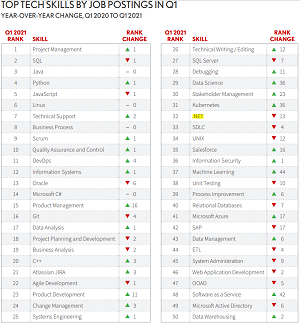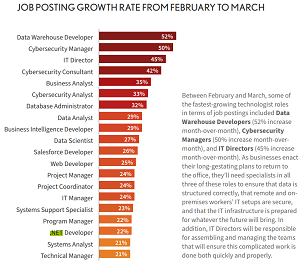News
.NET Developer Job Postings Tank in Q1
Technical careers specialist Dice published its Q1 2021 Tech Job Report that details the fastest-growing hubs, roles and skills.
In that latter segment, skills, the No. 1 item -- just like last year -- is Project Management. Of special interest to Visual Studio Magazine readers, however, is a freefall for demand in .NET skills. Those skills rank No. 32 on the chart, falling 13 places from last year's report. That's the second-biggest decrease among the top 50 skills tracked in the report. C# skills stayed the same (No. 14), while Microsoft Active Directory fell 6 places to No. 49.
 [Click on image for larger view.] Top Tech Skills by Job Postings in Q1 (source: Dice).
[Click on image for larger view.] Top Tech Skills by Job Postings in Q1 (source: Dice).
The report also ranks top tech occupations, where .NET Developer clocked in at No. 37, again registering the biggest drop from 2020, 16 places.
 [Click on image for larger view.] Top Tech Occupations by Job Postings in Q1 (source: Dice).
[Click on image for larger view.] Top Tech Occupations by Job Postings in Q1 (source: Dice).
Things don't get much better in job posting growth rate from February to March, in which .NET Developer showed an increase of 22 percent, placing that job at No. 18 on the top 20 list, beating out only System Analyst and Technical Manager, both seeing a 21 percent increase. The top item on that chart is Data Warehouse Developer.
 [Click on image for larger view.] Job Posting Growth Rate from February to March (source: Dice).
[Click on image for larger view.] Job Posting Growth Rate from February to March (source: Dice).
However, it's a bit better story in the cloud, where Microsoft has placed its biggest bets lately.
"The past quarter also saw a rise in the number of jobs demanding Microsoft Azure (ranked 41st, improved by 17)," Dice said. "Although Amazon Web Services (AWS) has long dominated the cloud-computing market, the popular perception is that Microsoft has managed to gain marketplace ground over the past year. Given that many companies have already had Microsoft-centric tech stacks for many years, perhaps it's no surprise that there's an accompanying need for Azure skills (Microsoft also argues that GitHub, the massive code repository it purchased in 2018 for $7.5 billion, increases Azure adoption by exposing developers and companies to new examples of successful Azure-based deployments)."
Stepping away from .NET and Microsoft-specific stuff to the general tech job scene, Dice said, "Tech hiring has consistently increased since November 2020, with each month outperforming the last. Overall, the first quarter of 2021 showed a 28 percent increase in job postings from the fourth quarter of 2020. While any quarter-by-quarter analysis is impacted by factors like seasonality, the drastic increase we saw in this quarter-over-quarter suggests more than just a general optimism about the recovery of the economy.
"Increasing confidence in an imminent economic recovery seems to be translating into a widespread demand for talent across a variety of industries and verticals. As we cover in this report, of the top fifty hiring organizations thus far into 2021, 60 percent are hiring more than in the pre-pandemic Q1 2020. More than ever, organizations need technologists who have the experience to help them innovate and transform strategies for growth; if anything, COVID-19 only accelerated the pace of digitization for businesses around the globe."
In addition to skills and occupations, the report breaks down the data into sections on location and employers,
Here's the job posting methodology for the report:
To gather these insights, job posting data was provided by Dice's partner, Burning Glass Technologies, which has a database of more than 1 billion current and historical job postings worldwide. Dice analyzed over 1.5 million tech job postings in the U.S. To gather our specific dataset, we filtered for "Information Technology" jobs with hours that fall under "Full Time," "Part Time" and "Not Listed," as well as job types that are categorized as "Permanent," or "Not Listed." The datasets used for the "Employers" section were gathered by using the above criteria, with an additional filter for job postings that only derive from employer sites.
You can get the report here.
About the Author
David Ramel is an editor and writer at Converge 360.